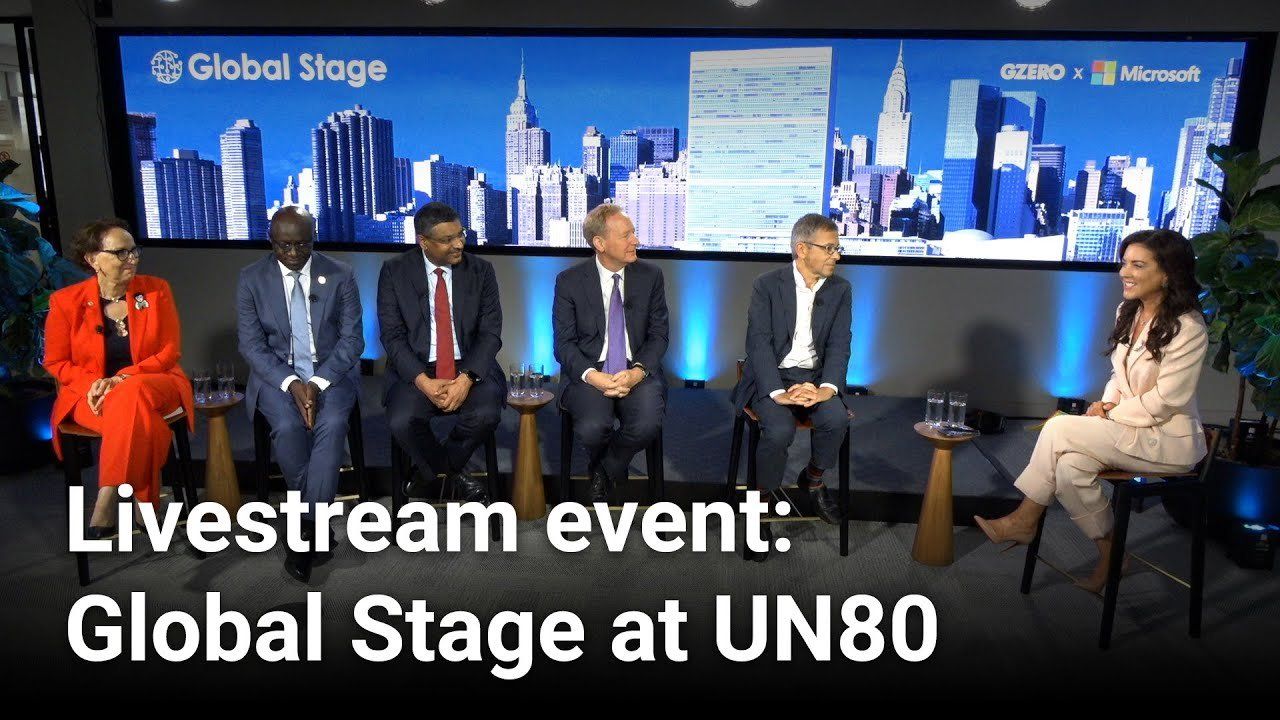September 24, 2025
A world beset by war, widening inequality, climate stress, and runaway AI demands institutions that can still deliver. In a Global Stage conversation recorded live on the sidelines of the 80th United Nations General Assembly, moderated by journalist Julia Chatterley, our expert panel probes whether multilateralism can adapt amid crisis and competition.
The panelists test the resilience of global cooperation as conflicts in Ukraine, Gaza, and Sudan strain resources and trust. Ian Bremmer, president and founder of Eurasia Group, argues that despite volatility—especially around U.S. policy—existing institutions remain indispensable, even as power dynamics shift. Rebeca Grynspan, secretary‑general of UNCTAD and former vice president of Costa Rica, warns that tariff escalations and budget cuts risk devastating the most vulnerable economies and humanitarian efforts, urging protection for least‑developed countries and smarter, more efficient use of limited funds. Brad Smith, vice chair and president of Microsoft, highlights how technology and “data center diplomacy” can boost efficiency and service delivery, while Ambassador Philip Thigo, Kenya’s special envoy on technology, underscores the Global South’s growing role in shaping consensus and the need for multistakeholder governance that brings private sector, civil society, and academia to the table.
The discussion zeroes in on AI’s uneven diffusion—and what it will take to close the gap in electricity access, connectivity, and digital skills so adoption translates into productivity and inclusive growth. S. Krishnan, secretary at India’s Ministry of Electronics and Information Technology (MeitY), positions India as a bridge between North and South, leveraging low‑cost digital public infrastructure and frugal innovation to help countries leapfrog in targeted areas. Smith urges nations to focus not on building chips but on deploying AI to amplify existing strengths and talent, while Bremmer notes that pragmatic engagement with both US and Chinese tech ecosystems can help countries avoid dependency. The optimistic takeaway: reform is necessary, cooperation is rising, and leaders have real agency to steer technology toward the common good.
This conversation is presented by GZERO in partnership with Microsoft, as part of the Global Stage series, which convenes global leaders for critical conversations on the geopolitical and technological trends shaping our world.
From Your Site Articles
- UN Palestinian Ambassador Riyad Mansour urges Palestinian statehood as a path to peace ›
- Zelensky vies for the world’s attention at UN, as Russia resets its nuclear red line ›
- The world is on fire and the UN is running out of money ›
- Trump at the UN: Teleprompter trouble and tough talk ›
- Live premiere Nov. 3: Global Stage at the Abu Dhabi Global AI Summit - GZERO Media ›
More For You
Hellenic coast guard performs SAR operation, following migrant's boat collision with coast guard off the Aegean island of Chios, near Mersinidi, Greece, February 4, 2026.
REUTERS/Konstantinos Anagnostou
15: The number of migrants who died after their boat accidentally collided with a Greek Coast Guard vessel in the Aegean Sea on Tuesday. Two dozen people were rescued.
Most Popular
Walmart is investing $350 billion in US manufacturing. Over two-thirds of the products Walmart buys are made, grown, or assembled in America, like healthy dried fruit from The Ugly Co. The sustainable fruit is sourced directly from fourth-generation farmers in Farmersville, California, and delivered to your neighborhood Walmart shelves. Discover how Walmart's investment is supporting communities and fueling jobs across the nation.
Workers repair a pipe at a compound of Darnytsia Thermal Power Plant which was heavily damaged by recent Russian missile and drone strikes, amid Russia's attack on Ukraine, in Kyiv, Ukraine February 4, 2026.
REUTERS/Valentyn Ogirenko
Democratic Alliance leader John Steenhuisen announced Wednesday that he will not run for a third term as leader of the liberal, pro-business party, after months of internal pressure over a host of controversies – including allegations, since cleared, that he used the party credit card for Uber Eats.
© 2025 GZERO Media. All Rights Reserved | A Eurasia Group media company.
